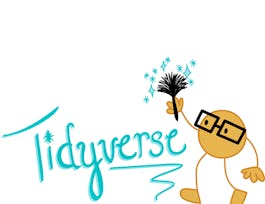Getting data into your statistical analysis system can be one of the most challenging parts of any data science project. Data must be imported and harmonized into a coherent format before any insights can be obtained. You will learn how to get data into R from commonly used formats and harmonizing different kinds of datasets from different sources. If you work in an organization where different departments collect data using different systems and different storage formats, then this course will provide essential tools for bringing those datasets together and making sense of the wealth of information in your organization.

Give your career the gift of Coursera Plus with $160 off, billed annually. Save today.


Importing Data in the Tidyverse
This course is part of Tidyverse Skills for Data Science in R Specialization



Instructors: Carrie Wright, PhD
1,885 already enrolled
Included with 
(44 reviews)
Recommended experience
What you'll learn
Describe different data formats
Apply Tidyverse functions to import data into R from external formats
Obtain data from a web API
Details to know

Add to your LinkedIn profile
5 assignments
See how employees at top companies are mastering in-demand skills

Build your subject-matter expertise
- Learn new concepts from industry experts
- Gain a foundational understanding of a subject or tool
- Develop job-relevant skills with hands-on projects
- Earn a shareable career certificate


Earn a career certificate
Add this credential to your LinkedIn profile, resume, or CV
Share it on social media and in your performance review

There are 6 modules in this course
A basic data type in the tidyverse is the tibble. Tibbles store tabular data and are a modern take on the standard R data frame. They have many user-friendly features that are an improvement over standard data frames when doing interactive data analysis. The remainder of this module covers tabular data in spreadsheet formats like Excel, CSV, TSV, and other delimited files.
What's included
15 readings1 assignment
Data can come in non-tabular formats, especially unstructured data or data that otherwise would not fit into a table. JSON and XML are common formats for storing arbitrarily structured data and this module covers the packages used to read in those data formats. In addition, relational databases are common for storing very large collections of tables where you do not need to read in the entire dataset at once. There are many relational database formats and we will cover the SQLite format, which is a compact and simple to use format.
What's included
10 readings1 assignment
Reading in data from various Internet sources can be a useful way to build analyses that need to be regularly updated. The rvest and httr packages are useful for connecting to web sites, web APIs and other online sources of data.
What's included
11 readings1 assignment
Working with others in a data science project often involves reading output or data produced using other statistical analysis packages or other software. This module covers packages for reading in these foreign formats, as well as images and data from Google Drive.
What's included
3 readings1 assignment
Now we will demonstrate how to import data using our case study examples. When working through the steps of the case studies, you can use either RStudio on your own computer or Coursera lab spaces provided for each case study.
What's included
11 readings2 ungraded labs
This project will give you the opportunity to read in data from multiple sources and conduct some simple operations on those data.
What's included
2 readings1 assignment
Instructors



Offered by
Recommended if you're interested in Data Analysis

Duke University

Johns Hopkins University

Johns Hopkins University

Johns Hopkins University
Why people choose Coursera for their career




Learner reviews
Showing 3 of 44
44 reviews
- 5 stars
75.55%
- 4 stars
20%
- 3 stars
4.44%
- 2 stars
0%
- 1 star
0%
New to Data Analysis? Start here.

Open new doors with Coursera Plus
Unlimited access to 7,000+ world-class courses, hands-on projects, and job-ready certificate programs - all included in your subscription
Advance your career with an online degree
Earn a degree from world-class universities - 100% online
Join over 3,400 global companies that choose Coursera for Business
Upskill your employees to excel in the digital economy
Frequently asked questions
Access to lectures and assignments depends on your type of enrollment. If you take a course in audit mode, you will be able to see most course materials for free. To access graded assignments and to earn a Certificate, you will need to purchase the Certificate experience, during or after your audit. If you don't see the audit option:
The course may not offer an audit option. You can try a Free Trial instead, or apply for Financial Aid.
The course may offer 'Full Course, No Certificate' instead. This option lets you see all course materials, submit required assessments, and get a final grade. This also means that you will not be able to purchase a Certificate experience.
When you enroll in the course, you get access to all of the courses in the Specialization, and you earn a certificate when you complete the work. Your electronic Certificate will be added to your Accomplishments page - from there, you can print your Certificate or add it to your LinkedIn profile. If you only want to read and view the course content, you can audit the course for free.
If you subscribed, you get a 7-day free trial during which you can cancel at no penalty. After that, we don’t give refunds, but you can cancel your subscription at any time. See our full refund policy.


